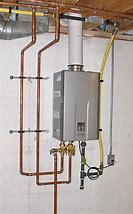|
Tankless Hot Water Heaters By Pierre Mouchette | Bits-n-Pieces Tankless compact water heater systems are more efficient in delivering hot water, and it helps the homeowner save on energy and utility costs over the use of traditional tank heaters. These systems are available for propane/natural gas and electric.
Using a tankless hot water heater, you can have hot water whenever you need it. These systems instantly heat water as it flows through the device and does not retain any water internally except for what is in the heat exchanger coil, making these heaters highly efficient and safe. With today’s technology, an endless supply of hot water is available when needed. Unlike standard units, which continuously heat and reheat the water to be always hot, tankless heaters generate hot water instantly using high-powered gas burners or electric coils. Yes, this instant heating requires more power, but because the water does not have to be reheated again and again, like in a standard tank model, tankless systems use less energy overall. Pros and Cons of Compact Water Systems Does the system provide instant hot water at a uniform temperature? Pro: After running (wasting) the cold water from the pipes out of the faucet, tankless water heaters can instantly provide an unending stream of hot water. Con: Inconsistent water temperatures due to the heater’s inability to simultaneously send enough hot water to multiple outlets. It has also been noted that the faucets must be opened fully to activate the heater. What is the expected life of a tankless water heater? Pro: Most tank heaters have a life expectancy of ten years, whereas tankless models function for twice as long. Con: A more extended lifespan equates to a more expensive unit, with the tankless unit costing more than twice as much. They are also more costly to install, so labor fees must be factored into the overall price tag. Pro: While these systems are more expensive, they are also more efficient. Consumer Reports indicate that tankless water heaters are 22% more efficient than standard models. The monthly savings might be nominal, but homeowners can expect to save hundreds of dollars annually. Con: Tankless water heaters supply a steady stream of hot water, but the supply is not unlimited. Standard models heat several gallons of water at once, perfect for a single person taking a shower or washing the dishes. But if an individual is running the dishwasher or washing machine while someone else is taking a shower (or two people are taking showers in two different bathrooms at the same time), a tankless heater is not equipped to keep up. A traditional water heater, which can store between 30 and 80 gallons, will not have a problem providing hot water to multiple outlets at the same time. Electronic ignition means no standing pilot light that constantly uses energy in gas-fired systems. When purchasing a system, use an ENERGY STAR certified tankless water heaters for additional savings. Tankless Hot Water Heaters Have a Compact Design
Advantages and Disadvantages of Tankless Hot Water Heaters Advantages - the main advantage of a tankless water heater system is the continuous flow of hot water as compared to the limited flow of continuously heated hot water from conventional tank water heaters, and
Operation of a Tankless Hot Water Heater The heater is usually turned off but is equipped with flow sensors that activate it when water travels through them, and a negative feedback loop is used to bring water to the target temperature. Water circulates through a copper heat exchanger (copper heat exchangers are preferred because of their high thermal conductivity and ease of fabrication) and is warmed by gas or electrical heating. Tankless heater controls Tankless water heaters can be further divided into two categories according to their heating capability: "full on/full off" versus "modulated." Full-on/full-off units do not have a variable power output level; the unit is either entirely on or off. This can cause an annoying and possibly hazardous variation of hot water temperature as water flow through the heater varies. Modulated tankless water heaters change their heat output in response to the flow rate of water running through the unit. This is usually done using a flow sensor, a modulating gas valve, an inlet water temperature sensor, and an outlet water temperature sensor-choke valve. A properly configured modulating heater can supply the same output temperature of water at differing water flow rates within their rated capacity. A wise investment for now and the future - increase your home’s value with a tankless water heater. You will obtain an improved Home Energy Rating System (HERS) Index Score and optimized LEED certification. Additionally, available energy efficiency rebates and tax credits offer the opportunity to help make your purchase more affordable. Comments are closed.
|
Archives
May 2024
|
